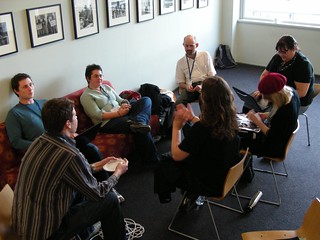LEARNING FROM EVENTS: UNCONFERENCES, ALTUS & THE SCOBLEIZER
/ Meetings happen, and then they're done. Presentations happen, and then they're done. Even the best events, meetings, and presentations have limited value if we can't step back in time.
Meetings happen, and then they're done. Presentations happen, and then they're done. Even the best events, meetings, and presentations have limited value if we can't step back in time.
Two recent posts talk about how to take those steps back in time -- by planning ahead -- and using available technology and tools to hold onto the material such that it can be found and used when needed.
Charles Hamilton writes about Using the Web and Social Media to Create More Effective Events. He gives a great explanation of what he did to support an "unconference" on the future of journalism (site here). I know I'm going to return to this post the next time I'm organizing a meeting (and I should be thinking about what I could even do for class presentations).
One of the key take-aways for me was Charles' comment that, "In the future, I would recommend creating the event-specific web site much sooner, and using a simpler CMS-, group-blog, social-network or wiki-based system for posting pre-event discussions and comments." Get the group going early and make it easy for them to connect. His overall evaluation of the process:
I found that attendees’ blogging, tweeting, recording and instant posting about the event reinforced what they were thinking and learning. Thus, the effectiveness of the event was increased, along with the potential for new learning and insights to cause change in the wider world.
By planning ahead, and interacting ahead, they were able to build the background for greater learning and future reuse. For some of my earlier thoughts on this please see “Poof” goes your idea… When face to face meetings are worse than virtual ones. My second example is more personally exciting. My friend and colleague, Ted Cocheu (Founder & CEO of Altus365) was interviewed by Robert Scoble for Building43! [flashvideo file=http://blip.tv/rss/flash/3065883 /] From Altus365' website:
Altus365' end-to-end video management software enables users to capture, share and search rich media content down to the spoken word. With Altus365 vSearch, content is accessible on-demand where it can be instantly located and reused.
Imagine being able to search the spoken and visual content of your events, meetings, presentations. Imagine being able to reuse the material and learn what you need, when you need it.
Altus365 provides the tools and services to make this happen. Companies like Cisco and Oracle have seen the value in this process for years. They have to constantly update their employees and their customers on quickly changing products and services. Other companies have been triggered by the economic downturn to hold their events virtually or in a hybrid form -- but have seen that there is a multiplier on the value of the on-demand content -- if it is searchable and easily available for reuse.
Ted tells Scoble that though a relationship with a new client often starts because they want to generate content from an urgent, upcoming meeting -- that then many clients quickly see how much more value they could be gaining from all the other video content they already have. The content can be more accessible using the Altus365 process and more social. Individual's who've given a presentation or created other kinds of content have profiles so you can find more of their work, and/or make connections to your own. You can also see their groups and decide whether those groups would provide value to you too. Sure, there are "point solutions" that can do pieces of this, but Altus365 has the jump on the end-to-end, secure, solution. One thing I wish... That the Building 43 video had been put through the Altus365 process so I could search through it.... I will help you out with some timestamps:
- 11:40 in discussion on the difference between "point solutions" versus an overall approach.
- 21:20 discussion of the "spoken word" aspects and search quality -- ties nicely to modern presentation formats (more pictures, less text to search on, unless you have the transcript or speaker notes).
- 23:00 Seb Grady of Altus365 demonstrates the search capability. He reports that the average YouTube video is 2-3 min; in the enterprise the average video is 47 min -- none of us have time to watch the whole thing. We need to find what we need, when we need it, on whatever platform is best.
- 25:00 More use case info -- Scoble talks about the trouble they had building presentations at Microsoft from material they already had -- and how even when they did find the right slides, they didn't have the accompanying material related to those slides.
Events, meetings, and presentations count as organizational practices in the world of TOP Management (technology, organization, people). Just as any single technology or person can't run the business on its own, neither can an organizational practice provide needed value without support from the people (the content providers) or the technologies. Both Hamilton's example and the Altus365 approach are ways to powerfully leverage technology, organization, and people for greater value over the long haul. Don't let those ideas go "poof"!







